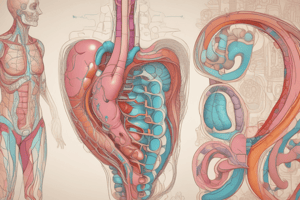Podcast
Questions and Answers
What is one of the main functions of the urinary system?
What is one of the main functions of the urinary system?
- Facilitating nutrient absorption
- Removing waste products and excess fluid (correct)
- Filtering air for respiration
- Regulating body temperature
Which part of the digestive system is primarily responsible for the absorption of nutrients?
Which part of the digestive system is primarily responsible for the absorption of nutrients?
- Large intestines
- Stomach
- Mouth
- Small intestines (correct)
What characterizes a long bone?
What characterizes a long bone?
- Has a complex shape
- Facilitates movement and supports body weight (correct)
- Found in the skull
- Provides stability with little movement
What is the role of external intercostal muscles in respiration?
What is the role of external intercostal muscles in respiration?
Which of the following is NOT a cause of kidney problems?
Which of the following is NOT a cause of kidney problems?
Which part of the large intestines is involved in the final stages of digestion?
Which part of the large intestines is involved in the final stages of digestion?
Which of the following accurately describes sensory nerves?
Which of the following accurately describes sensory nerves?
Flat bones are primarily found in which of the following locations?
Flat bones are primarily found in which of the following locations?
What is the primary function of the esophagus in the digestive system?
What is the primary function of the esophagus in the digestive system?
What type of bones are characterized by their complex shapes?
What type of bones are characterized by their complex shapes?
Flashcards
Urinary System Function
Urinary System Function
Removes waste and excess fluid, maintains homeostasis, regulates acid-base balance, electrolyte concentrations, extracellular fluid volume, and blood pressure.
Kidney Problems Causes
Kidney Problems Causes
Congenital abnormalities, diabetes, and high blood pressure (hypertension) can lead to kidney problems.
Digestive Tract Start
Digestive Tract Start
The mouth is the beginning of the digestive system.
Stomach Function
Stomach Function
Signup and view all the flashcards
Small Intestines Role
Small Intestines Role
Signup and view all the flashcards
Long Bones Location
Long Bones Location
Signup and view all the flashcards
Short Bones Role
Short Bones Role
Signup and view all the flashcards
External Intercostals
External Intercostals
Signup and view all the flashcards
Sensory Nerves
Sensory Nerves
Signup and view all the flashcards
Motor Nerves
Motor Nerves
Signup and view all the flashcards
Study Notes
Urinary System Functions
- Removes waste products and excess fluid
- Maintains homeostasis
- Regulates acid-base balance
- Controls electrolyte concentrations
- Regulates extracellular fluid volume
- Regulates blood pressure
Urinary System Parts
- Kidneys
- Ureters
- Bladder
- Urethra
Kidney Problems/Diseases
- Congenital abnormalities
- Diabetes (high blood sugar)
- High blood pressure (hypertension)
Digestive System Parts and Functions
- Mouth: Beginning of digestive tract
- Throat (Pharynx): Where food travels
- Esophagus: Delivers food to the stomach
- Stomach: Sac-like organ with strong muscular walls, mixes food
- Small Intestines:
- Made of three segments (duodenum, jejunum, ileum)
- 20 feet long
- Peristalsis moves food through the intestines
- Duodenum: breaks down food
- Jejunum and Ileum: absorb nutrients
- Large Intestines (Colon):
- Divided into four parts (ascending, transverse, descending, sigmoid)
- 7 feet long
Accessory Muscles of Respiration
- Intercostal Muscles:
- External: primary inspiratory muscles
- Internal: accessory expiratory muscles
- Abdominal Muscles: Accessory expiratory muscles
Types of Bones
- Long Bones: Support body weight, facilitate movement, located in lower limbs
- Short Bones: Provide support and stability, located in wrist and ankle joints
- Flat Bones: Flat bones in the skull, thoracic cage (sternum and ribs), protect internal organs (brain, heart)
- Irregular Bones: Complex shapes, varying structure, protect internal organs (vertebral column protects spinal cord)
Respiratory System
- Respiratory System: Network of organs and tissues for breathing
- Components: Airways, lungs, blood vessels
- Function: Moves oxygen, eliminates waste products
Nervous System
- Differentiates between sensory and motor nerves
- Sensory Nerves: Carry signals from sensory organs to the brain
- Motor Nerves: Carry signals from the brain to muscles and glands
Studying That Suits You
Use AI to generate personalized quizzes and flashcards to suit your learning preferences.
Description
Test your knowledge on the functions and parts of the urinary and digestive systems. This quiz covers aspects like waste removal, homeostasis, and the organs involved in digestion, such as the stomach and intestines. Assess your understanding of common kidney problems and the overall digestive process.




